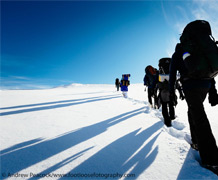
Image courtesy of Andrew Peacock.
Exeter launches Extreme Medicine Masters programme
The University of Exeter Medical School has teamed up with World Extreme Medicine to launch a Masters programme to equip healthcare professionals to practise medicine in the world’s most remote and challenging environments.
The Extreme Medicine programme, endorsed by world-renowned explorer Sir Ranulph Fiennes, will upskill healthcare professionals providing them with skills to practise high-quality medicine in challenging environments including at altitude, in tropical or polar climates or in response to humanitarian crises. It will include hands-on scenarios to prepare for delivering quality medical care, despite the challenges of terrain, environment or access to resources. Graduates will have the skills to deliver excellent care amidst disaster zones or on expedition to remote locations.
The Medical School has teamed up with World Extreme Medicine, co-founded by Mark Hannaford, originally from Plymouth in South Devon. Mark, an expedition leader and adventurer, recognised that medical arrangements on such missions were often ad-hoc, and identified the need for high-quality medical support. Twelve years ago, he co-founded World Extreme Medicine, providing courses to teach doctors, nurses and paramedics the skills and mind-set to practise effectively away from the usual clinical environment. He went on to establish the World Extreme Medicine conference series which offers a platform for leaders in their field to share best practice and to bring like-minded medics together. Mark said: “As the global response to worldwide humanitarian crises improves, there’s a need for greater coherence and professionalism in everything from distributing aid to delivering the best possible care. Thanks to Dartmoor and a culture of outdoor living, Devon has a proud history of exploration, and the University of Exeter’s innovative outlook and reputation for excellence mean they are the perfect partners to deliver the world’s first Masters programme in Extreme Medicine.”
The programme will entail rescue scenarios on the UK's mountains and moorlands, with added realism including actors, props and explosions. It will prepare graduates to look for signs of injuries and conditions which are not seen in day-to-day practice in the UK, such as frostbite and altitude sickness, and will have a particular focus around remote medical skills and trauma.
Sir Ranulph Fiennes, who lives on Exmoor, said: “This programme covers a subject matter that is very close to my heart, and is a key element of a movement to bring together the sometimes disparate but overlapping worlds of exploration, humanitarian crises and medicine. It’s medicine that saves the lives of not only the most remote explorer but also populations devastated by natural disasters, covering those most in need in the most vulnerable of places.”
Dr Malcolm Hilton, Acute Sub Dean at the University of Exeter Medical School and a Consultant Surgeon, said: “Exeter already has a reputation for sports excellence – this year we are The Times and Sunday Times Sports University of the Year. This programme will take our commitment to education and research in this area to a new level. It will help meet the global need for the highest standard of care possible in any environment. Graduates will be equally equipped to deliver healthcare on a mountain, in the aftermath of an earthquake or in a desert, as they are in a hospital.”
The University is now recruiting healthcare professionals to the three year part-time programme, which starts in September. To find out more about eligibility or to apply, visit our postgraduate study site.
Date: 17 May 2016
